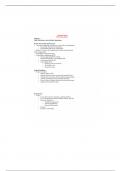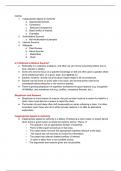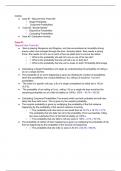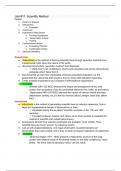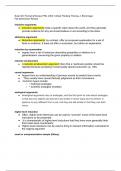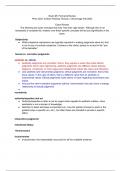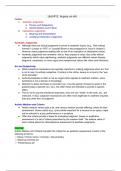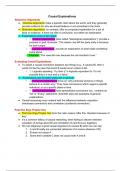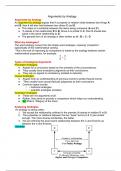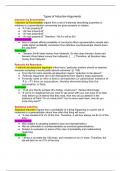Sam Houston State University
Latest uploads at Sam Houston State University. Looking for notes at Sam Houston State University? We have lots of notes, study guides and study notes available for your school.
-
148
-
2
-
15
All courses for Sam Houston State University
Popular books Sam Houston State University
Latest notes & summaries Sam Houston State University
This is a comprehensive and detailed review note for finals in Nurs 3320. U'll need it for real!!
The text discusses the appropriate use of authority and expertise when evaluating claims. It emphasizes the importance of skepticism and critical thinking when faced with expert advice. The text also highlights the fallacy of inappropriate appeal to authority and provides several criteria for determining whether an appeal to authority is appropriate or not. The text further explains the concept of an appropriate domain of expertise, stating that certain subjective areas like ethics and aesthe...
Outline Case #1: “Beyond Here There Be” Single Probability Conjoined Probabilities Case #2: “Buzzer Beater” Disjunctive Possibilities Computing Probabilities Case #3: Graduation Anxiety
Unit #11: Scientific Method - Deductivism and inductivism are methods used in the scientific method. - Deductivism involves deriving scientific laws through deductive methods from metaphysical truths. - Examples of deductivism include Aristotle deducing the shape of the solar system and Hippocrates deducing the causes of mental disorders. - Inductivism involves generating scientific laws through inductive reasoning from observations or data. - Examples of inductivism include Johannes Kepler...
The third exam for PHIL 2303: Critical Thinking, taught by Thomas J. Brommage, will cover various topics related to critical thinking. Inductive arguments are claims about the world that provide evidence for why we should believe or act according to the claim. On the other hand, abductive arguments offer proposed explanations for a set of facts or evidence. Induction by enumeration involves generalizing from a set of instances describing properties or relations. Reductio ad absurdum argues again...
Exam #5: Format & Review PHIL 2303: Critical Thinking Thomas J. Brommage Fall 2023 The following concepts are important for the upcoming exam: 1. Subjectivity: While art judgments are subjective, they are not entirely subjective. Beauty is not solely in the "eye of the beholder." 2. Factual vs. Normative Judgments: Aesthetic and ethical judgments are normative, but they use different values. Ethical judgments involve moral blame and praise. 3. Authority/Expertise and Art: Authorit...
Unit #12: Art Inquiry This unit focuses on aesthetic judgments, privacy, subjectivity, artistic medium, interpretive judgments, meaning, and justifying interpretive judgments. Aesthetic judgments are evaluative or interpretive, expressing values like beauty, elegance, complexity, vision, and influence. While subjective impressions play a role, authority/expertise is not as important in aesthetics. Artistic medium varies, and different criteria are used for assessment. The exercise involves cons...
Causal explanations are different from inductive arguments as they provide explanations rather than conclusions. There are two types of explanations: reason explanations and causal explanations. Reason explanations provide a purpose or goal, while causal explanations explain what caused something to happen. When evaluating causal explanations, it is important to consider the difference between causation and correlation. A fallacy of causal reasoning is Post Hoc Ergo Propter Hoc, which fails to d...
Arguments by Analogy are based on the idea that if a certain property or relation exists between two things (A and B), it will also exist between two other things (C and D) that share a similarity with A. Analogies are often expressed as A : B :: C : D. There are different types of analogical arguments, including Precedent Analogies that rely on similarities in circumstances, Causal Analogies that predict future events based on previous ones, and Illustrative Analogies that provide comparisons t...
There are four types of inductive arguments: Induction by Enumeration, Reductio Ad Absurdum, Statistical Induction, and Higher-level Induction. Induction by Enumeration argues from specific instances to a generalization. Reductio Ad Absurdum argues against a position by showing it leads to absurd outcomes. Statistical Induction infers generalizations based on the probability of a thing happening. Higher-level Induction uses more general inferences to overrule lower-level ones. Examples are provi...

